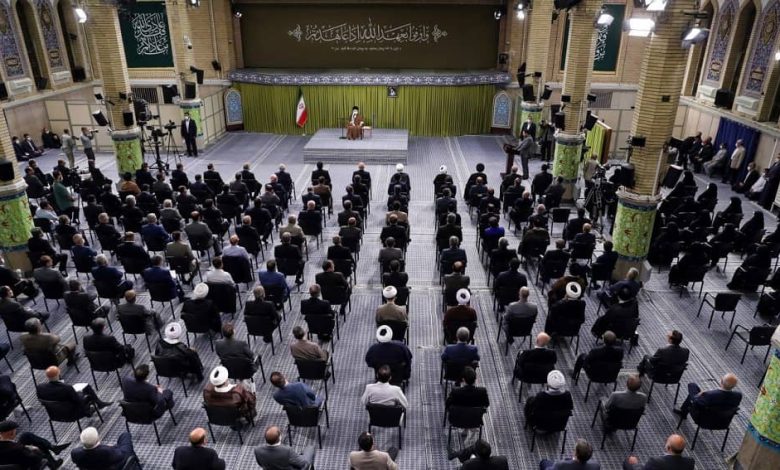Khamenei’s Admission of Failure: Iran’s Power Consolidation Plan in Shambles

khamenei majlis parliament meeting (1)
Written by
Mahmoud Hakamian
On May 24, a month after his speech in Eid-Al Fitr’s prayer in which he called for unity in his regime, Supreme Leader Ali Khamenei was once again forced to warn his “consolidated system’s” officials to avoid attacking each other.
“When one wants to destroy someone or looks at them as a rival, they attempt to bring each other down. This approach, whether by the government or the parliament, is dangerous,” he said in a meeting with his handpicked MPs.
On April 22, Khamenei met with the heads of branches of his regime and tacitly acknowledged his failure in consolidating power in his regime, a project he began shortly after the nationwide 2019 uprising that rattled his regime’s foundations.
“A very important strategy is the cooperation between heads of three branches. They all should cooperate and synthesize. The constitution has created a perfect opportunity for them to work together; if so, they can overcome every problem. I advise the heads of the three branches not to block each other’s path and instead to pave the way for one another,” he said.
A week later, the regime’s parliament impeached Reza Fatemi Amin, the Minister of Industry, Mines, and Trade in Ebrahim Raisi’s government, seemingly due to corruption in his Ministry. Yet, during the debates, it was revealed that he had indirectly given at least 65 SUVs to the MPs, who surprisingly voted in favor of his impeachment.
In his meeting with the regime’s parliamentarians on May 24, Khamenei expressed his frustration and anger over Fatemi Amin’s impeachment, which also laid bare the regime’s pervasive corruption.
Iranian regime’s supreme leader, Ali Khamenei, delivered two speeches this week in which he made it clear the nationwide uprising and its persistence have created a deadlock for the ruling theocracy.#IranRevoIution https://t.co/Vru0CXmUhS
— NCRI-FAC (@iran_policy) April 23, 2023
“With a destructive perspective, the parliament misuses its observatory tools, such as questions, warnings, and impeachment. For example, a Minister who was appointed three months ago gets impeached. This is because you look at the government as your rival,” he said.
Khamenei also reminded his handpicked MPs how he “loves” and “believes” in this Majlis. “I have always considered this Majlis as a revolutionary parliament, and I repeat this fact now,” he added.
To solidify regime control, Khamenei advocated an uncompromising vision of a “young and Hezbollahi” government, determined to advance his agenda and suppress a dissatisfied populace. With precision, he selected the Majlis and orchestrated the sham 2021 presidential elections to guarantee Raisi’s triumph, something he celebrated as the “Sweetest event in 2021.”
But what this “Sweetest event” and the “consolidated system” brought to Iranians? Nothing but oppression and misery.
“This parliament and the government both entered office with promises of economic improvement and resolving people’s livelihood issues. However, have we witnessed any improvements in key economic indicators such as the economic growth rate or the inflation rate? Has there been an increase in investment or foreign capital attraction? Have we experienced more capital inflow or capital flight during this period?” wrote the state-run Setar-e Sobh newspaper on May 24.
“Comparing these factors reveals that the performance has been suboptimal. Currently, all indicators deviate from the standard norms. On the contrary, the promised actions have not materialized, and the slogans advocating for better living conditions remain unfulfilled. Are housing poverty rates higher today, or were they higher in the past few years? It is evident that the economic indicators do not paint a favorable picture,” the paper adds.
But, Khamenei remains indifferent to the nation’s dire financial catastrophe, as his regime not only birthed but also fanned the flames of these prevailing societal and economic perils. In his relentless pursuit of absolute control, he steadfastly rejects any semblance of duality or compromise.
“There exists a duality characterized by approximation and destruction. One perspective is based on approximation, while the other is destructive in nature. The destructive viewpoint emphasizes the dominance of rival powers over mindsets. It portrays a competitive mindset aiming to defeat and overpower the opponent. This perspective carries inherent risks and can be considered dangerous,” he said in this regard in his speech on May 23.
Undoubtedly, as internal discord engulfs the regime amidst a sweeping nationwide rebellion and the specter of fresh waves of dissent, the demise of the oppressive regime at the hands of the Iranian people and their organized Resistance movement will be accelerated.

